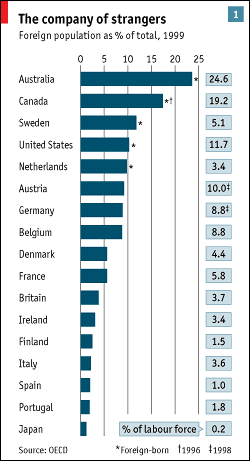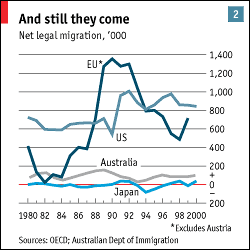|
| ||||||
| |
|
|
“WITH two friends I started a journey to Greece, the most horrendous of all journeys. It had all the details of a nightmare: barefoot walking in rough roads, risking death in the dark, police dogs hunting us, drinking water from the rain pools in the road and a rude awakening at gunpoint from the police under a bridge. My parents were terrified and decided that it would be better to pay someone to hide me in the back of a car.”
This 16-year-old Albanian high-school drop-out, desperate to leave his impoverished country for the nirvana of clearing tables in an Athens restaurant, might equally well have been a Mexican heading for Texas or an Algerian youngster sneaking into France. He had the misfortune to be born on the wrong side of a line that now divides the world: the line between those whose passports allow them to move and settle reasonably freely across the richer world's borders, and those who can do so only hidden in the back of a truck, and with forged papers.
Tearing down that divide would be one of the fastest ways to boost global economic growth. The gap between labour's rewards in the poor world and the rich, even for something as menial as clearing tables, dwarfs the gap between the prices of traded goods from different parts of the world. The potential gains from liberalising migration therefore dwarf those from removing barriers to world trade. But those gains can be made only at great political cost. Countries rarely welcome strangers into their midst.
|
| |
 | |
|
|
Everywhere, international migration has shot up the list of political concerns. The horror of September 11th has toughened America's approach to immigrants, especially students from Muslim countries, and blocked the agreement being negotiated with Mexico. In Europe, the far right has flourished in elections in Austria, Denmark and the Netherlands. In Australia, the plight of the Tampa and its human cargo made asylum a top issue last year.
Although many more immigrants arrive legally than hidden in trucks or boats, voters fret that governments have lost control of who enters their country. The result has been a string of measures to try to tighten and enforce immigration rules. But however much governments clamp down, both immigration and immigrants are here to stay. Powerful economic forces are at work. It is impossible to separate the globalisation of trade and capital from the global movement of people. Borders will leak; companies will want to be able to move staff; and liberal democracies will balk at introducing the draconian measures required to make controls truly watertight. If the European Union admits ten new members, it will eventually need to accept not just their goods but their workers too.
Technology also aids migration. The fall in transport costs has made it cheaper to risk a trip, and cheap international telephone calls allow Bulgarians in Spain to tip off their cousins back home that there are fruit-picking jobs available. The United States shares a long border with a developing country; Europe is a bus-ride from the former Soviet block and a boat-ride across the Mediterranean from the world's poorest continent. The rich economies create millions of jobs that the underemployed young in the poor world willingly fill. So demand and supply will constantly conspire to undermine even the most determined restrictions on immigration.
For would-be immigrants, the prize is huge. It may include a life free of danger and an escape from ubiquitous corruption, or the hope of a chance for their children. But mainly it comes in the form of an immense boost to earnings potential. James Smith of Rand, a Californian think-tank, is undertaking a longitudinal survey of recent immigrants to America. Those who get the famous green card, allowing them to work and stay indefinitely, are being asked what they earned before and after. “They gain on average $20,000 a year, or $300,000 over a lifetime in net-present-value terms,” he reports. “Not many things you do in your life have such an effect.”
Such a prize explains not only why the potential gains from liberalising immigration are so great. It explains, too, why so many people try so hard to come—and why immigration is so difficult to control. The rewards to the successful immigrant are often so large, and the penalties for failure so devastating, that they create a huge temptation to take risks, to bend the rules and to lie. That, inevitably, adds to the hostility felt by many rich-world voters.
This hostility is milder in the four countries—the United States, Canada, Australia and New Zealand—that are built on immigration. On the whole, their people accept that a well-managed flow of eager newcomers adds to economic strength and cultural interest. When your ancestors arrived penniless to better themselves, it is hard to object when others want to follow. In Europe and Japan, immigration is new, or feels new, and societies are older and less receptive to change.
Even so, a growing number of European governments now accept that there is an economic case for immigration. This striking change is apparent even in Germany, which has recently been receiving more foreigners, relative to the size of its population, than has America. Last year, a commission headed by a leading politician, Rita Süssmuth, began its report with the revolutionary words: “Germany needs immigrants.” Recent legislation based on the report (and hotly attacked by the opposition) streamlines entry procedures.
|
| |
 | |
|
|
But there is a gulf between merely accepting the economic case and delighting in the social transformation that immigrants create. Immigrants bring new customs, new foods, new ideas, new ways of doing things. Does that make towns more interesting or more threatening? They enhance baseball and football teams, give a new twang to popular music and open new businesses. Some immigrants transform drifting institutions, as Mexicans have done with American Catholicism, according to Gregory Rodriguez, a Latino journalist in Los Angeles. And some commit disproportionate numbers of crimes.
They also profoundly test a country's sense of itself, forcing people to define what they value. That is especially true in Europe, where many incomers are Muslims. America's 1.2m-1.5m or so Muslim immigrants tend to be better educated and wealthier than Americans in general. Many are Iranians, who fled extremist Islam. By contrast, some of the children of Germany's Turks, Britain's Pakistanis and France's North Africans seem more attracted to fundamentalism than their parents are. If Muslims take their austere religion seriously, is that deplorable or admirable? If Islam constrains women and attacks homosexuality, what are the boundaries to freedom of speech and religion? Even societies that feel at ease with change will find such questions hard.
Immigration poses two main challenges for the rich world's governments. One is how to manage the inflow of migrants; the other, how to integrate those who are already there.
Whom, for example, to allow in? Already, many governments have realised that the market for top talent is global and competitive. Led by Canada and Australia, they are redesigning migration policies not just to admit, but actively to attract highly skilled immigrants. Germany, for instance, tentatively introduced a green card of its own two years ago for information-technology staff—only to find that a mere 12,000 of the available 20,000 visas were taken up. “Given the higher wages and warmer welcome, no Indians in their right minds would rather go to Germany than to the United States,” scoffs Susan Martin, an immigration expert at Georgetown University in Washington, DC.
Whereas the case for attracting the highly skilled is fast becoming conventional wisdom, a thornier issue is what to do about the unskilled. Because the difference in earnings is greatest in this sector, migration of the unskilled delivers the largest global economic gains. Moreover, wealthy, well-educated, ageing economies create lots of jobs for which their own workers have little appetite.
So immigrants tend to cluster at the upper and lower ends of the skill spectrum. Immigrants either have university degrees or no high-school education. Mr Smith's survey makes the point: among immigrants to America, the proportion with a postgraduate education, at 21%, is almost three times as high as in the native population; equally, the proportion with less than nine years of schooling, at 20%, is more than three times as high as that of the native-born (and probably higher still among illegal Mexican immigrants).
All this means that some immigrants do far better than others. The unskilled are the problem. Research by George Borjas, a Harvard University professor whose parents were unskilled Cuban immigrants, has drawn attention to the fact that the unskilled account for a growing proportion of America's foreign-born. (The same is probably true of Europe's.) Newcomers without high-school education not only drag down the wages of the poorest Americans (some of whom are themselves recent immigrants); their children are also disproportionately likely to fail at school.
These youngsters are there to stay. “The toothpaste is out of the tube,” says Mark Krikorian, executive director of the Centre for Immigration Studies, a think-tank in Washington, DC. And their numbers will grow. Because the rich world's women spurn motherhood, immigrants give birth to many of the rich world's babies. Foreign mothers account for one birth in five in Switzerland and one in eight in Germany and Britain. If these children grow up underprivileged and undereducated, they will create a new underclass that may take many years to emerge from poverty.
For Europe, immigration creates particular problems. Europe needs it even more than the United States because the continent is ageing faster than any other region. Immigration is not a permanent cure (immigrants grow old too), but it will buy time. And migration can “grease the wheels” of Europe's sclerotic labour markets, argues Tito Boeri in a report for the Fondazione Rodolfo Debenedetti, published in July. However, thanks to the generosity of Europe's welfare states, migration is also a sort of tax on immobile labour. And the more immobile Europeans are—the older, the less educated—the more xenophobic they are too.
The barriers need to be dismantled with honesty and care. It is no accident that they began to go up when universal suffrage was introduced. Poor voters know that immigration threatens their living standards. And as long as voters believe that immigration is out of control, they will oppose it. Governments must persuade them that it is being managed in their interests. This survey will suggest some ways in which that might be done.
| Copyright © 2002 The Economist Newspaper and The
Economist Group. All rights reserved. |